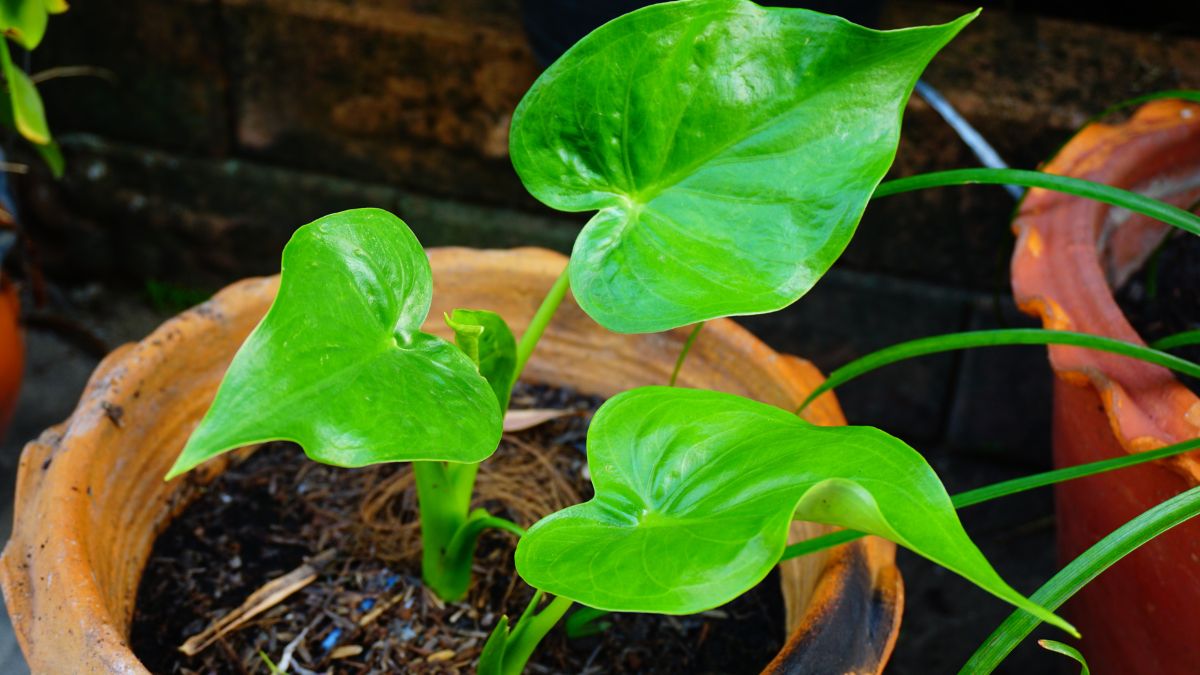It is essential to use the Best Potting Soil for Elephant Ears if you want your plant to enhance the look of your garden or landscape. These plants are easy to grow and maintain and add significant beauty with their magnificent stance. When planted in the right environment, they thrive and grow to their full potential.
Aside from growing them as garden plants, elephant ears are also great for outdoor containers and patio planters. They lend a tropical aura when grown in pots in any outdoor setting with very little effort. Additionally, there are many varieties of elephant ear plants to choose from.
In this blog post, we give you the best information about the requirements to grow these plants healthily. These include soil type, insight into the origins of the plant, growing methods, and care tips. Have a look below to learn more about these majestic eyecatchers.
Elephant Ear Plant Explained
Elephant ears are foliage plants native to the Asian tropical regions. They belong to the Araceae plant family and get their name because of the shape of their large leaves. These plants are quite easy to grow and can be planted from a bulb. They also flourish in humid temperatures and are sought-after ornamental cultivars.
Elephant ears are perennial plants that grow well with the proper care and maintenance. They are also excellent for a beginner or established gardener as they aren’t very demanding. Growing these plants in pots is a great way to give outdoor spaces a colorful, tropical look without putting in a lot of work.
Using the best potting soil for elephant ears is essential to properly cultivate them. There are also a variety of different types of these plants that you could opt for. Seeing that they are easy to grow and care for, having them as a part of your indoor space, patio, or garden would be beneficial.
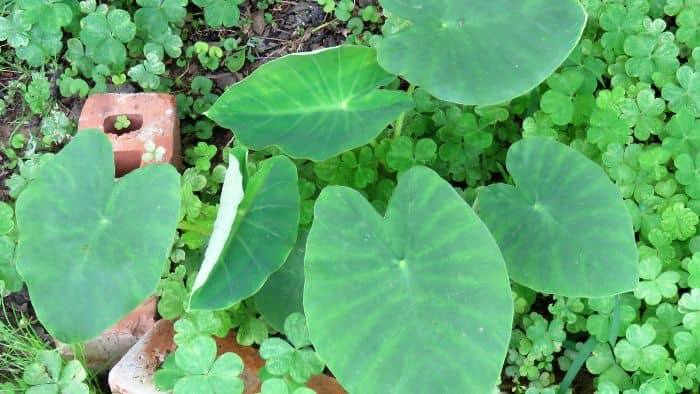
Best Potting Soil for Elephant Ears
For these plants to reach their full potential, it is vital to use the best potting soil for elephant ears as it will help them thrive. For this reason, soil with an acid pH balance between 5.5 and 6.5 would be ideal. If the soil has a pH that is higher or lower than this, your plant will not get the right amount of nutrients to grow well.
Without the required nutrients, the plant would gradually wither away. To ensure that your elephant ear plants are growing in the best environment, a soil test kit should be used to determine the pH level. The majority of these kits include instructions on how to alter the pH of your soil to reach the desired level.
For elephant ear plants to thrive, planting them in an organic potting mix is best. This would include a combination of peat moss, leaf compost, perlite, and vermiculite in equal parts. The soil mix should also be amended with well-rotted manure as elephant ear plants appreciate rich soil that is high in organic matter. Alternatively, you can also use coir fiber or potting soil made from composted wood chips instead.
Growing Elephant Ear Plants – Tips
Now that you know what is the best potting soil for elephant ears, growing and maintaining them should be easy. These plants stand out because of their evergreen color which is eye-catching. Elephant ear plants are interesting to grow and look great both indoors and out.
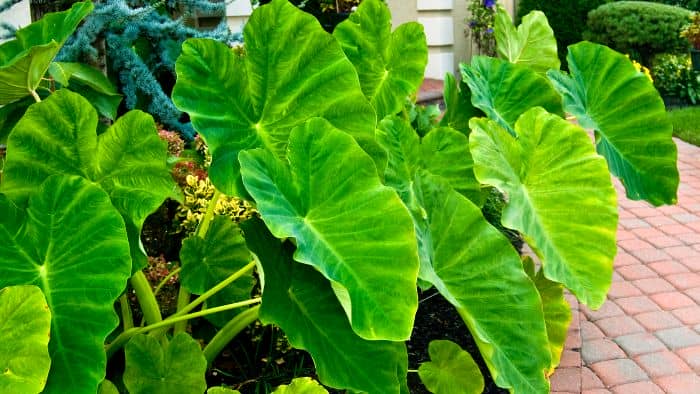
Listed Below are a Few Tips to Consider When Growing these Magnificent Plants:
- Make sure to harden the elephant ear plants a week before putting them outside.
- Although the plants require little care once they are established, make sure to check on them.
- Water the plants frequently if your region experiences very hot weather.
- When growing these plants, it is essential to frequently fertilize the soil using a slow-release fertilizer.
- Elephant ear plants cannot endure extremely cold climates because their foliage and tubers are prone to deterioration in icy cold weather.
- Transplanting is recommended if you want to protect your plant from the elements during harsh seasons.
- Also, keep in mind that these plants lay dormant during the winter months.
Here’s a video that shows you how to grow elephant ear plants.
Elephant Ear Plant Care Tips
When you have elephant ear plants in your indoor or outdoor garden, seeing them thrive is always pleasing. However, without the proper care, these plants can lose their majestic stance and wither away. This can be very disappointing, especially after all the hard work you’ve put in.
Yellowing or burnt leaves, wilting, or stumped growth are all signs of a sick plant. To avoid this, follow our plant care tips below. It will ensure that your elephant ears stay healthy and happy all year through!
1. Unfavorable Conditions in the Soil
Discoloration of your plant’s leaves and stems could be a result of poor soil conditions. Use porous soil so you won’t have to worry about water retention issues because it drains effectively. For this reason, acidic soil is recommended to help these plant grow their best.
2. Imbalance in the Water
Water imbalance is the most typical cause of your elephant ear plant leaves yellowing. When the soil is not properly moistened, particularly as a result of excessive irrigation, it can result in an imbalance. Therefore, you shouldn’t leave the soil soggy, making sure there is just enough soil moisture.
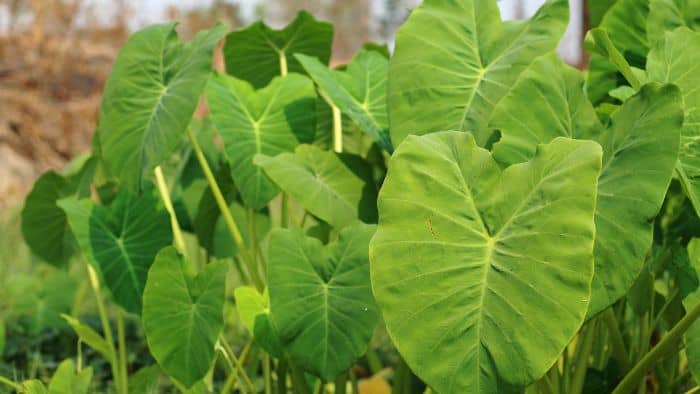
3. Milder Climates
Altering between dry and wet soil is one thing that greatly stresses your plants. This is unfortunately due to wrongly-timed watering schedules. When a plant is under stress, it eventually changes color. Low humidity and dry soil pose serious risks to your plants. In these circumstances, the leaves begin to droop and turn brown, especially around the edges. Therefore, you should make sure your plants are kept in an environment with the appropriate humidity level. You can also opt to place them in a tray of water and pebbles or spray them with a humidifier.
4. Insufficient Light
The process of photosynthesis requires enough light for evergreen plants. Elephant ear plants thrive in regions with indirect sunshine and bright lighting. Their foliage will burn if exposed to direct sunlight for an extended amount of time, which can flaw their appearance. Therefore, it is vital to ensure that you put your ear plants in an area that is well-lit but shielded from the sun.
5. Insects or pests
Spider mites are one type of sap-sucking insect that lives in soil and tends to rob plants of moisture. Elephant ear plants are hence vulnerable to these insects. Other pests include scale, mealybugs, and aphids. The primary remedy for this issue is to make sure that you cultivate your plants in a place that is free of dust. Using pesticide oil or neem oil will be the best option if the plant is already infested. These oils will eliminate pests in no time.
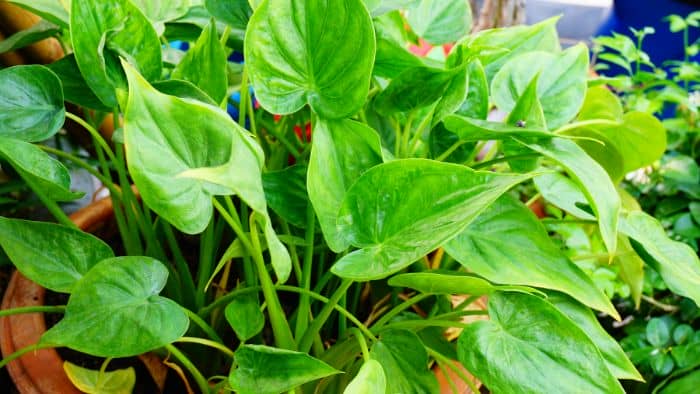
Conclusion
Without organic matter in the soil, plants won’t receive the essential nutrients they need to thrive. This will ensure that your plant grows to its full potential and its foliage stays lush.
Also, keep in mind that these plants don’t do well in direct sunlight exposure for more than 3 hours a day. Shaded, bright light is best to grow them as it will also ensure that their leaves do not burn. The aim of this article was to help you have a better understanding of growing elephant ear plants in your home or garden.
Adding them to your collection of outdoor potted plants will afford you a beautiful landscape. I recommend that you plant at least a few varieties of them. Each one has breathtaking properties that will liven up your home and yard. To learn more about these plants, here’s an informative link.
FAQs
[rank_math_rich_snippet id=”s-31710d4c-8b0a-4bdd-a882-32d06056f1f2″]

